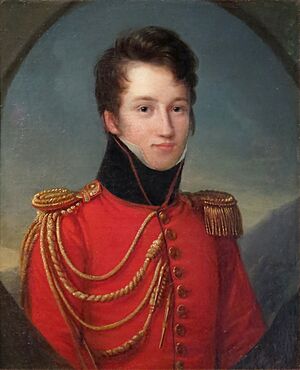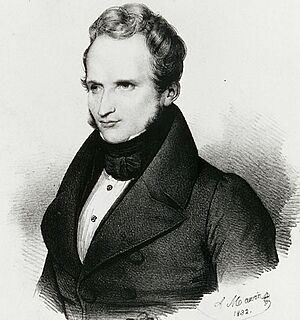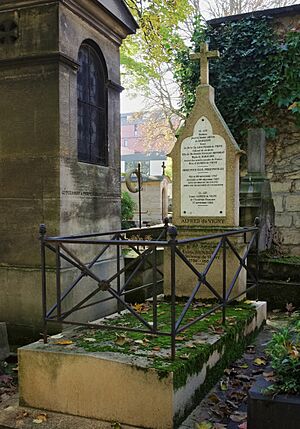Alfred de Vigny facts for kids
Quick facts for kids
Alfred Victor, Comte de Vigny
|
|
|---|---|
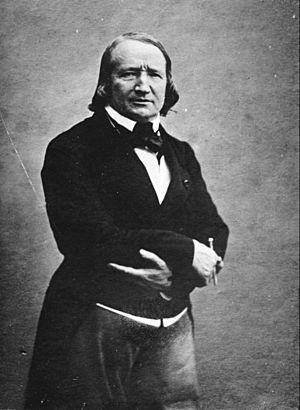
Vigny, by Félix Nadar.
|
|
| Born | Alfred Victor, Comte de Vigny 27 March 1797 Loches, France |
| Died | 17 September 1863 (aged 66) Paris, France |
| Occupation | Poet, translator, novelist |
| Literary movement | Romanticism |
Alfred Victor, Comte de Vigny (born March 27, 1797 – died September 17, 1863) was an important French poet. He was one of the first leaders of the French Romanticism movement. He also wrote novels, plays, and translated plays by William Shakespeare.
Biography
Alfred de Vigny was born in Loches, France, into a noble family. His father was an older army veteran. His mother was a strong woman who taught him when he was young.
Vigny grew up in Paris. He studied French history and the Bible. He also developed a great love for the military.
His family's wealth was greatly reduced after the French Revolution. After Napoleon was defeated, a king named Louis XVIII came back to power. In 1814, Vigny joined the king's guard as a second lieutenant.
Vigny was promoted in the army, but he found military life boring during peacetime. He took many breaks from the army. In 1827, he left the military to focus on writing. He had already published his first poem, Le Bal, in 1820. He also wrote a long poem called Éloa in 1824.
He settled in Paris with his English wife, Lydia Bunbury, whom he married in 1825. In 1826, he published a collection of his poems called Poèmes antiques et modernes. A few months later, he released Cinq-Mars. This was the first important historical novel in French. It was about a plot against Cardinal Richelieu.
With the success of these books, Vigny seemed to be a rising star in the Romantic movement. However, his friend Victor Hugo soon became more famous. Vigny remained politically neutral. He accepted different governments during his lifetime.
In 1827, an English theater group visited Paris. This made French people interested in Shakespeare again. Vigny worked on translating Romeo and Juliet. In 1831, he wrote his first original play, La Maréchale d'Ancre. This play was a historical drama about events leading to King Louis XIII's rule. While at the theater, he met the famous actress Marie Dorval. They worked together on plays.
In 1835, Vigny wrote a play called Chatterton. It was based on the life of Thomas Chatterton. Marie Dorval starred in it. Chatterton is still considered one of the best French romantic dramas. Vigny also wrote a philosophical novel called Stello (1832). In it, he explored how poets fit into society. He believed poets should stay a bit separate from society. His book Servitude et grandeur militaires (1835) looked at the life of a soldier.
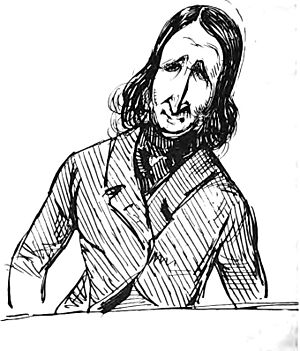
Even though Vigny became a successful writer, his personal life was not always happy. After his mother died in 1838, he inherited a property called Maine-Giraud. People said he withdrew there to his 'ivory tower'. This means he spent time alone, thinking and writing. There, he wrote some of his most famous poems, like La Mort du loup. In 1845, Vigny became a member of the Académie française, a very important French institution.
In his later years, Vigny stopped publishing new works. But he kept writing. His Journal (diary) is now seen as a great work itself. Vigny saw himself as a thinker. He was one of the first French writers to be interested in Buddhism. His own ideas about life were often serious, but he valued human kindness, learning, and helping others. He was the first writer to use the word "spleen" to describe a feeling of sadness or gloom in modern people. He spent his last years preparing a collection of poems called Les Destinées.
Vigny became ill in his early sixties. He faced his illness with great courage. He died in Paris on September 17, 1863, a few months after his wife. He was buried next to her in the Cimetière de Montmartre in Paris. Some of his works were published after he died.
Works
- Le Bal (1820).
- Poèmes (1822).
- Éloa, ou La Sœur des Anges (1824).
- Poèmes Antiques et Modernes (1826).
- Cinq-Mars (1826).
- Roméo et Juliette (1828, translation of Romeo and Juliet).
- Shylock (1828, adapted from the original by William Shakespeare).
- Le More de Venise (1829, translation of Othello).
- La Maréchale d'Ancre (1830).
- L'Almeh: Scènes du Désert (1831, unfinished).
- Stello (1832).
- Quitte pour la Peur (1833).
- Servitude et Grandeur Militaires (1835).
- Chatterton (1835).
- Daphné (1837, unfinished).
- Les Destinées (1864, illustrated by Nicolas Eekman in 1933.).
- Journal d'un Poète (1867).
- Œuvres Complètes (1883–1885).
See also
 In Spanish: Alfred de Vigny para niños
In Spanish: Alfred de Vigny para niños


